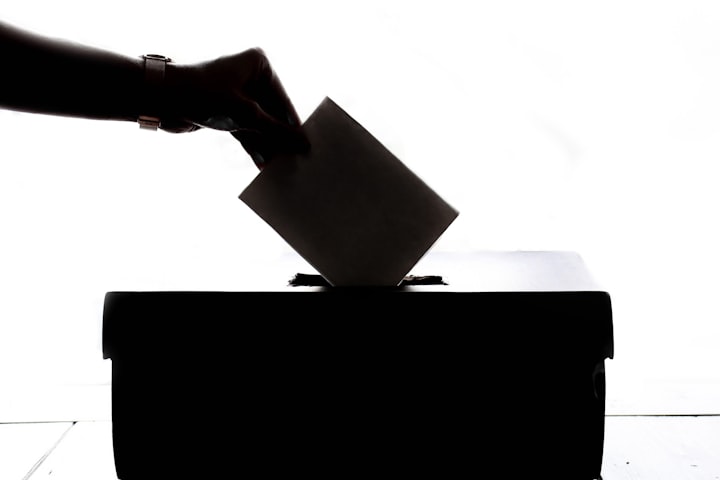"F" IT! Pick Politicians Randomly!
Why chance is more equal.

One day, my Dad and I were talking, as bitter commies do. We were talking politics and the topic of salaries came up. Historically, in many democracies, politician salaries were originally relatively low, more fitting with what was seen as a noble civil duty. As such, it became apparent that only those already wealthy could afford to live on such a low income, so it was raised so that anyone can become a politicians. My Dad defended this by saying;
“If you pay peanuts, you get monkeys”.
I responded
“Yeah, but now we just have expensive monkeys”.
Modern Representational Democracy seems to be plagued with a litany of issues that parallel my Dad’s expensive monkeys. From corruption to greed, conflict of interest to absenteeism, party politics to in-fighting, and anti-intellectualism to profiteering.
There has always been issues throughout history but there seems to a near world-wide consensus that governments have become, aside from the few good, altruistic people, packed with self-interested liars.
So you know what? Screw it! Pick politicians randomly from the population!
What wait?
It goes by many names. Sortition. Allotment. Demarchy. My personal favourite is Lottocracy. While they can vary in specifics (Sortition is when a pool of candidates is randomly chose, Demarchy is when groups make decisions specific to them), Lottocracy is the main idea I’m talking about; similar to jury duty, a number of the public are randomly selected to take part in the process of governance.
But that can’t work!
Actually, not only does it work, it was one of the first versions of Democracy. While, yes, Athenian democracy was made up exclusively of land and slave owners, they were still pulled out of a pool of the population randomly, with campaigning being seen as scandalous, petty, and ultimately pointless.
This process, in more evolved forms, have been practiced from as far apart as Italy and India. India had the most adorable version; they used to let a child pull the names from a bowl; how is that not something we should do!
Either way, the practice of democracy has depended on the practicalities. In small enough groups, even villages or small towns, it’s possible to just gather everyone together and have them vote there and then. That’s called Direct Democracy. The form we have at the moment is called Representational Democracy; you elect an official to vote on your behalf. But there are many issues with this that can be solved if officials were randomly selected.
But not everyone is an expert!
It’s amazing how there’s still this myth around politicians, as if they are these super geniuses who got in purely by their intelligence. If you really believe that is the case and you’re willing to defend that belief, then what you believe in isn’t democracy but rather Technocracy. The first clue should be in the fact that people are elected; they don’t sit IQ tests or talk about their credentials. And even when they do talk about their area of expertise, it’s often horizontal relationship. If I see one more business tycoon talk about how they’ll be great for schools or hospitals one more time I will scream.
In most positions of government, actual experts are brought in to inform policy makers as to the pros and cons of decisions. Already, there is a system in place to give those making decisions the widest amount of knowledge to consider.
The question is, who do you trust more to listen to actual experts; the person who’s willing to listen or the person with an invested interest that conflicts with the information being presented?
This isn’t hyperbolic. Covid has shown how badly things can go when politicians ignore experts. Climate Change is happening because for decades politicians would rather ignore the evidence than turn on their backers. It’s also a little insulting to insinuate the average person is incapable of learning about a subject and making an informed decision.
If that was the case, doesn’t that call into question every election result ever?
But not everyone is cut out to be a politician!
I agree, which is why lottocracy is often talked about as an opt out system. It’s been said that often the best leader is someone who doesn’t want to be a leader. It takes a certain kind of sociopath to want to be in charge, but it takes a great level of humility to accept a duty.
Again, similar to jury duty, there is a reasonable expectation that some people should be excused, whether for prejudices, bias, or simply they can’t perform due to work, family arrangements, or personal issues. There is no opt out or excusing for represental democracy as it currently stands.
Again, elected officials have been shown to be extremely bias. Many have been shown to believe in ludicrous conspiracy theories about the government they take part in. Yet it’s okay to elect them? It’s okay to trust they can make decisions. Unless they’re part of a party and have done something extremely damning as to call for their resignation, there’s no way to take them out.
But what about representation!
What about it? You may feel represented. Maybe you’re even from the same neighbourhood as the elected official. Maybe you even know them personally and feel like they get you. Congratulations, you’re being represented, but that’s not representational democracy.
True Representation Democracy is supposed to vote on behalf of a group of people as their representative (hence the name). Yet we have politicians who vote against the wishes of their constituents all the time. Poor voters are somehow represented by people that think welfare should be cut. Parents with children who died in school shootings are left distraught when their representative vote against gun reform or regulations.
Can you really represent someone when you don’t have to deal with them?
We’ve seen the extremes of this narrow definition of representation. People of different races, abilities, ages, and classes have not just not been closed off from the world of politics, but when they are “invited”, it’s as voting blocks and monoliths, belittling the complex lives people live.
There’s something sick about politics more concerned with 50/50 gender representation in politics than with sexual assault on women. There’s something sick about calling a black conservative voting to imprison more people of colour as “progress” and “diversity”. The problem seemingly isn’t that people are being abused by their bosses but rather that their abusive bosses aren’t this or that.
These are people so far removed from the average person, they don’t even know what it’s like to be represented. Imagine what could be done for schools if teachers or those with learning-difficulties (such as myself) could decide school curriculum. Imagine how differently policing and law enforcement could be if victims of crimes or those falsely accused could make changes. Imagine how naturally inclusive things would be if the person deciding hate speech laws had actually had to deal with such abuse in their life.
How is that not more representational?
But what about politics!
Study after study has shown that the vast majority of voters aren’t actually as extreme as modern politics would have you believe. Often just explaining your side and coming to an agreement, compromise, or just standing your ground reasonably is enough to win over people. But much like any other form of entertainment, it’s the fanatics politicians cater to.
Party politics have been nothing but a plague for governments, turning them from once respectable halls of debate and appeal to shouting matches and lairs of backdoor deals. As I touched on before, it’s because of party politics that your representation isn’t really representational.
Parties pick the candidates they run. The decision as to who will represent you, for them, has already been made. You don’t get to decide who represents you. You don’t even get to know they’re the best person for the job. You just get to have a vague idea of where they line up politically.
You, a small business owner with social libertarian leanings, have no choice but to vote for a Neocon Ultra-Religious homophobe. You, a moderate liberal with environmental concerns, have no choice but to vote for the over compromising centralist willing to get in bed with the other side, especially when it comes to oil.So not only are you not being represented, but neither are your own politics.
And even if it’s not you picked this time around, there’s always next time. That’s the beauty of this. No one person can get to be in office their entire life or define an entire generation. But it would also refocus the attention from treating politics like a sports league to actually what it’s meant to be about; making the best decisions for a country and its people.
Plus, there are other forms of politics. Referendums are still a thing. Debates are still a thing. the only thing that would change in politics it the cancerous “Us vs Them” mentality that stops anything from getting done.
But it can’t be that easy!
You’re correct. It won’t be. The irony of all this is that for such a system to be implemented it would need to be put forward by politicians themselves. And there are many issues; practicality, stress, media attention, shifts in policy every term. This can’t solve every problem. But it doesn’t need to; it just needs to solve the problem that is can.
You can’t say people are not politically engaged anymore and say this wouldn’t give them a reason to be. You can’t say groups aren’t being represented and say this would help. You can’t say multi-term politicians are corrupt and stagnate and then say new blood wouldn’t revitalise and purify government.
Easy shouldn’t be synonymous with right. Often it is the difficult and new things that we should do. They would be stumbling blocks, yes. They may even be gaffs, yes. But no other system can really assure that people, for the first time in centuries, will have a real say in how they’re government is run.
Well… apart from Direct Democracy. But that’s for another time.
About the Creator
Conor Matthews
Writer. Opinions are my own. https://ko-fi.com/conormatthews






Comments
There are no comments for this story
Be the first to respond and start the conversation.